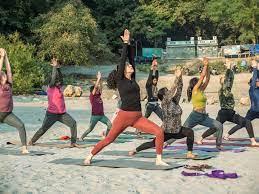Rishikesh, often called the Yoga Capital of the World, attracts seekers and teachers from all corners of the globe. For those who have already completed their 200-hour yoga teacher training and wish to deepen their practice and teaching skills, the 300 hour yoga teacher training in rishikesh is a transformative next step. This advanced training refines your understanding of yoga’s philosophy, practice, anatomy, and teaching methodologies—helping you evolve from a good instructor into an inspiring, knowledgeable teacher.
What Is a 300-Hour Yoga Teacher Training?
A 300-hour YTT is an advanced yoga certification designed for students who have completed a 200-hour YTT, making a total of 500 hours of professional yoga teacher training. Registered with Yoga Alliance, this program takes you beyond the basics—focusing on advanced asanas, in-depth study of yogic philosophy, meditation, pranayama, and teaching methodology.
Unlike the foundational 200-hour course that focuses on building the basics, the 300-hour program delves deeper into alignment, sequencing, anatomy, and spiritual development. It’s ideal for teachers who want to elevate their practice, gain confidence, and refine their teaching techniques with authenticity and depth.
Why Choose Rishikesh for Your 300-Hour YTT
Rishikesh offers an atmosphere unlike anywhere else in the world. Nestled in the foothills of the Himalayas and flowing with the sacred Ganges River, it is a land of spiritual awakening and ancient wisdom. Here, yoga isn’t just an exercise—it’s a way of life.
Training in Rishikesh allows students to immerse themselves in traditional yogic teachings under the guidance of Indian yoga masters who have devoted their lives to this ancient science. Ashrams and yoga schools in Rishikesh follow authentic, lineage-based practices that stay true to the roots of yoga. The peaceful environment, surrounded by nature, supports deep meditation, study, and self-reflection—essential for advanced training.
What You’ll Learn in the 300-Hour Course
The curriculum is both comprehensive and holistic. While each school may vary slightly, most 300-hour YTT programs in Rishikesh include:
1. Advanced Asana Practice
Students learn to refine complex postures, focusing on correct alignment, adjustment, and injury prevention. Teachers guide students in understanding how to adapt poses for different body types and abilities.
2. Pranayama and Breath Control
Pranayama practices are expanded to include advanced techniques such as Kapalabhati, Nadi Shodhana, Bhastrika, and Ujjayi. You’ll explore how pranic energy (life force) influences the mind and body, and how to use breath to enhance physical and mental clarity.
3. Yoga Philosophy and Spiritual Study
You’ll dive deeper into ancient yogic texts like the Patanjali Yoga Sutras, the Bhagavad Gita, and Hatha Yoga Pradipika. These teachings help students understand yoga beyond the mat as a philosophy of self-realization and conscious living.
4. Anatomy and Physiology
The program provides advanced knowledge of body mechanics, energy systems, and the science of movement. You’ll study how muscles, joints, and connective tissues work in different asanas, helping you teach safely and effectively.
5. Meditation and Mindfulness
Daily meditation sessions cultivate focus, peace, and awareness. Techniques like mantra meditation, Yoga Nidra, and mindfulness are taught to help teachers incorporate mental well-being into their classes.
6. Teaching Methodology and Sequencing
This component enhances your teaching style, communication skills, and confidence. You’ll learn how to design intelligent class sequences, give precise instructions, and manage students of varying levels.
7. Ayurveda and Yogic Lifestyle
Many programs include the study of Ayurveda—the sister science of yoga. You’ll learn how diet, lifestyle, and seasonal routines influence health and energy balance.
The Daily Routine
Life during a 300 hour yoga teacher training in rishikesh is disciplined and enriching. A typical day starts early with morning meditation and pranayama, followed by asana practice. After breakfast, classes continue with philosophy, anatomy, and teaching methodology. Evenings are often devoted to self-study, chanting, or group discussions.
Most schools maintain a sattvic (pure) lifestyle—offering vegetarian meals, quiet surroundings, and digital detox practices to support deep inner work. This structured schedule cultivates mindfulness, balance, and devotion to learning.
Duration and Certification
A 300-hour yoga teacher training usually lasts four to six weeks, depending on the school and curriculum. Upon successful completion, you’ll receive a certificate recognized by Yoga Alliance (RYT-300). When combined with your previous 200-hour certification, you can register as a RYT-500 (Registered Yoga Teacher 500)—a globally recognized professional credential.
Who Can Join the Program
This course is suitable for:
Graduates of a 200-hour YTT program (from any Yoga Alliance-registered school).
Yoga teachers seeking to expand their expertise and teaching depth.
Dedicated practitioners who want to explore yoga’s spiritual and philosophical roots.
While advanced postures are part of the training, flexibility or perfection in asanas is not mandatory. What’s more important is commitment, openness, and a genuine desire to grow.
The Benefits of a 300-Hour YTT in Rishikesh
Enhanced teaching skills: You’ll gain the confidence to teach advanced students and create safe, meaningful classes.
Personal transformation: The immersive environment fosters emotional healing, clarity, and spiritual growth.
Cultural and spiritual immersion: Living in Rishikesh offers a deeper connection to India’s yogic culture and ancient wisdom.
Global recognition: Graduating from Rishikesh adds authenticity and prestige to your yoga journey.
Final Thoughts
Completing a 300 hour yoga teacher training in rishikesh is much more than earning a certificate—it’s a journey of self-evolution. It challenges you physically, mentally, and spiritually, helping you embody yoga as a way of life rather than just a practice.



